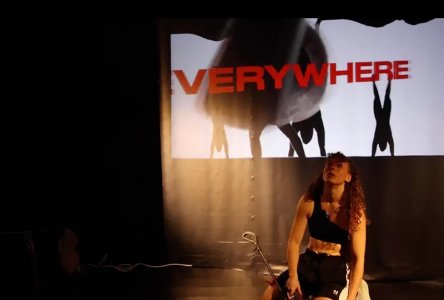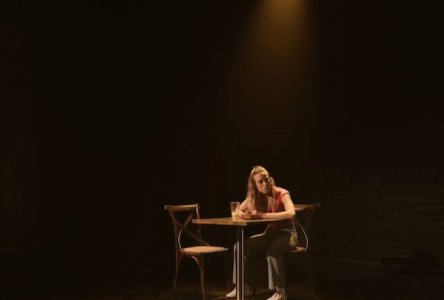
BIG GIRLS DON'T CRY
BIG GIRLS DON’T CRY, Upstairs Belvoir at Belvoir St Theatre, 5-27 April 2025. Photography by Stephen Wilson Barker: Dalara Williams, Megan Wilding and Stephanie Somerville; 2 - Williams and Nic English; 3 - Williams, Mathew Cooper, Somerville, Wilding, Guy Simon, Bryn Chapman Parish
The pre-show music sets scene and time – the mid-60s – as three young women: Cheryl, Lulu, and Queenie burst into Cheryl’s bedroom preparing for an evening out. They are plagued by universal questions of – which frock? Where’s the hair spray? Will he like me? Who’s got my shoes? But this is Redfern and to those questions they must add – will we get through the evening without police trouble? And racial insults? The answer is: no.
Playwright Dalara Williams (she also plays Cheryl) has chosen 1966 for what is in effect a Blak history play. There are matters of great moment, against the frivolity of preparing for pub nights, anticipating the Debutante Ball, and sighing over a random bloke who looked like Mick Jagger. Those living in now fashionable Redfern might not know that 1969’s Sydney Black Theatre group led to the National Black Theatre under the leadership of Bettie Fisher in 1972 and within a couple of years to the warehouse premises in Botany Street where Blak theatre took off into the hearts and minds of Aboriginal people everywhere.
In Dalara Williams’s world it’s through passionate activist and Sydney Uni student, Ernie (Charles Perkins-inspired Guy Simon), that the focus is on the 1965 Freedom Ride through NSW and how it changed his life and outlook. Through letters to Cheryl from Michael (Mathew Cooper) it’s apparent that he’s in the army in Vietnam. When Queenie (Megan Wilding) is fired from her factory job it isn’t because she was late for work but because she’s a mouthy, uppity black bitch and the white supervisor acts with impunity. Much the same when Officer Robinson (Bryn Chapman Parish) uses his police power to abuse the friends on an innocent night out.

On the play’s second night, a high school drama club group was in the audience as they’d chosen the play and had their reduced-price tickets to see it. (What a heartwarming sentence to write!) They were among the most attentive and appreciative, learning about recent Indigenous history in the flesh. For others, brought up – theatrically – on the 20th-century work of Jack Davis, Bob Maza, Kevin Gilbert, Eva Johnson, Richard Walley, and many more of the early 21st century, it was deja vu with jokes and 2025 sass.
Directed by Ian Michael, the impetus and varying characters rarely falter. Scenes and locations are minimally sketched via lights and furniture on and off a revolve (set: Stephen Curtis, lighting: Kelsey Lee). That this is ostensibly a period piece is signaled by Emma White’s dolly bird costumes for the dolly birds and still-of-the-‘50s baggy pants for the men. While Brendon Boney’s city soundscape is a reminder that the bush is another country.
It’s something Cheryl thinks about because she’s not from the city and is uncertain about where she should be. Stephanie Somerville’s Lulu is a fragile, sweet-natured young woman whose ambitions are domestic and simple. Megan Wilding’s Queenie is, as ever, outrageously Megan Wilding: rambunctious, outrageous, and afraid of nothing and no one. Occasionally there’s a flash of underlying tenderness, but not often.

Time goes by – way too much time: a 40-minute cut to the three hours running time dumping repetition, exposition, and joke signaling would not go astray. It’s a year in the lives of the women and their men – including ally and white guy Milo (Nic English) – and Williams takes them on some nicely unexpected twists and turns. Gasps and giggles from the audience indicate surprise and amusement as well as quiet absorption. And some boredom or incomprehension (quite a few empty seats post-interval).
Chekhov’s gun is brought to mind when Michael, dripping with blood, watches the party from the shadows. What does this mean? Is he dead? Is he an apparition? Is there a meaning a white viewer is too dense to pick up on? Who knows, but it’s unnerving and never goes off bang. Nevertheless, Big Girls Don’t Cry – which may or may not refer to the Four Seasons’ 1962 hit – is a giant achievement for Dalara Williams, flaws’n’all.
Next time, it would be good to have her work with a tough dramaturg, but meanwhile, the scene she gifts Wilding and Simon is a laugh-aloud gem, and the company, while uneven, is committed and never less than interesting. The end…well! Don’t let anyone spoil it for you.
Comments
Leave a Comment
Enter your username and password to comment. Don't have a username? Register now.




Be the first to leave a comment below